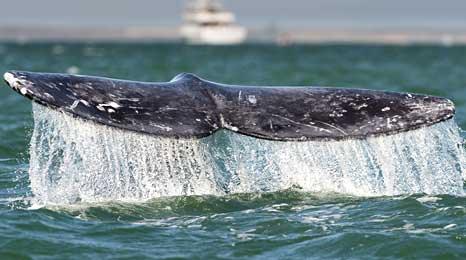Secrecy of talks on whaling compromise condemned
- Published

The annual meeting of the International Whaling Commission (IWC) has opened with attention focussing on a deal that could regulate whaling for 10 years.
The opening session was swiftly adjourned so that delegates could begin a day and a half of private talks.
Some observers condemned the secrecy, one commenting that recent UN talks on North Korea's nuclear programme were held in public - so why not on whaling?
Conservation groups are split on the merits of pursuing a deal.
Some argue for maintaining a hard line against all whaling, while others believe agreement could improve the current picture, where Iceland, Japan and Norway set their own quotas and run their hunts without international oversight.
Anthony Liverpool, the IWC commissioner for Antigua and Barbuda, chaired the brief opening session, and warned of hard work ahead.
"Since [the 2008 meeting in] Anchorage, we've held around 10 intersessional meetings... this illustrates how serious we are at finding a solution to the problems we face in order that the IWC can become as relevant as possible," he said.
"I do not know if we shall succeed - but I have hope."
Japan's IWC commissioner Akira Nakamae said his country would "like to respect this great effort for the future of the IWC".
Progress hopes
Japan was one of a core group of six nations that has worked intensively on the "peace proposal" since the Anchorage meeting.
Two months ago, the IWC chairman - Chilean diplomat Cristian Maquieira, who is not here, officially because of health reasons - released a draft proposal that was based on discussions held over the two years.
Under the proposal, annual quotas for Japan's Antarctic hunt would diminish from 935 minke whales now, initially to 400 and then to 200 in 2015.
Japan says these numbers are too low - but conservation groups and anti-whaling countries want to bring them down further.
They are also demanding that whalemeat must be restricted to domestic use only, with no international trade permitted.
"We really hope that the commissioners of the IWC make the progress they really need to on the deal," said Sarah Duthie, head of the oceans campaign with Greenpeace International.
"The proposal as it stands is simply not acceptable, and we need them to work hard over the coming days to to make sure that they turn it into a deal that works for whales rather than whalers," she told “óĻó“«Ć½ News.
However, other environment groups are taking a less nuanced position, arguing that the 1986 global moratorium on commercial whaling must be upheld, and that conservation groups should simply be fighting to end whaling by Iceland, Japan and Norway rather than talking about any deal.
"It would legitimise commercial whaling, and it would legitimise it for 10 years, rewarding bad behaviour by countries that did not abide by the moratorium," said Andy Ottaway, director of the UK-based group Campaign Whale.
"This deal wouldn't just open the door to commercial whaling, it would kick it wide open, because South Korea has said it wants a slice of the action, and there are whaling sleeping giants out there waiting to re-start."
South Korea - whose fishing boats routinely snare small whales and where whalemeat is available in restaurants - wants the compromise document to include a measure that would grant quotas to countries where "substantial indirect catches have been identified and used as traditional food for cultural and indigenous needs".
- Published22 June 2010
- Published20 June 2010
- Published27 May 2010